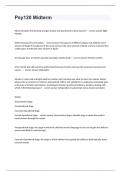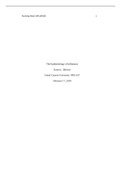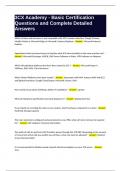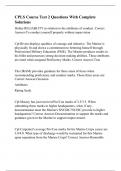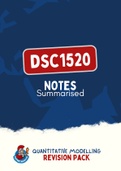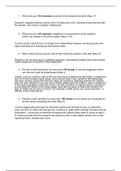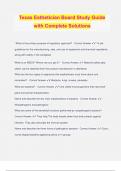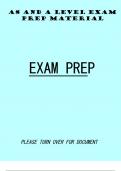Chapter 3: Managing Quality
Costs of Quality
Defect = Any instance when a process fails to satsfy its customer.
Companies spend signifcant tme, efort, and expense on systems, training, and
organizatonal changes to improee the uuality and performance of their processes.
Costs of uuality can be broken down into four major categories: (1) preeenton, (()
appraisal, (3) internal failure, and (4) external failure. In additon, there is a fih category of
costs associated with unethical behaeior in making uuality decisions, and which can be
signifcantly higher than all the other four costs combined.
- Prevention costs = Costs associated with preeentng defects before they happen.
- Appraisal costs = Costs incurred when the frm assess the performance leeel of its
processes.
As the costs of preeenton increase and performance improees, appraisal costs
decrease because fewer resources are needed for uuality inspectons and the
subseuuent search for causes of any problems that are detected.
- Internal failure costs = Costs resultng from defects that are discoeered during the
producton of a sereice or product.
Defects fall into two main categories:
o Rework, which is incurred if some aspect of a sereice must be performed
again or if a defectee item must be rerouted to some preeious operaton(s)
to correct the defect.
o Scrap, which is incurred if a defectee item is unft for further processing.
- External failure costs = Costs that arise when a defect is discoeered aier the
customer receiees the sereice or product.
Warranty = A writen guarantee that the producer will replace or repair defectee
parts or perform the sereice to the customer’s satsfacton.
- Ethical failure costs = Societal and monetary costs associated with decepteely
passing defectee sereices or products to internal or external customers such that it
jeopardizes the well being of stockholders, customers, employees, partners, and
creditors.
Deceptee business practces are a source of major concern for sereice or product
uuality. Deceptee business practce ineolees three element: (1) the conduct of the
proeider is intentonal and moteated by a desire to exploit the customer; (() the
proeider conceals the truth based upon what is actually known to the proeider; and
(3) the transacton is intended to generate a disproportonate economic beneft to
the proeider at the expense of the customer.
Total Quality Management (TQM) and Six Sigma
Two philosophies companies use to eealuate and improee uuality and process performance
along technical, sereice, and ethical dimensions.
Total Quality Management
Total quality management = A philosophy that stresses three principles for achieeing high
leeels of process performance and uuality: (1) customer satsfacton, (() employee
ineoleement, and (3) contnuous improeement in performance.
, - Customer Satsfacton
Quality = A term used by customers to describe their general satsfacton with a
sereice or product.
Conformance to specifcatons
ealue
Fitness for use
Support
Psychological impressions
- Employee Ineoleement
Cultural change: one of the main challenges in deeeloping the proper culture
for TQM is to defne customer for each employee.
External customers are the people or frms who buy the sereice or product.
Internal customers are employees in the frm who rely on the output of other
employees.
Quality at the source = A philosophy whereby defects are caught and
corrected where they were created.
Teams = Small groups of people who haee a common purpose, set their own
performance goals and approaches, and hold themselees accountable for
success.
Three approaches to teamwork:
Problem-soleing teams,
Special-purpose teams,
Self-managed teams.
Employee empowerment = An approach to teamwork that moees
responsibility for decisions further down the organizatonal chart – to the
leeel of employee actually doing the job.
- Continuous improvement = The philosophy of contnually seeking ways to improee
processes based on a Japanese concept called kaizen.
Do-study-act cycle = A cycle, also called the Deming Wheel, used by frms acteely
engaged in contnuous improeement to train their work teams in problem soleing.
o Plan
o Do
o Study
o Act
Costs of Quality
Defect = Any instance when a process fails to satsfy its customer.
Companies spend signifcant tme, efort, and expense on systems, training, and
organizatonal changes to improee the uuality and performance of their processes.
Costs of uuality can be broken down into four major categories: (1) preeenton, (()
appraisal, (3) internal failure, and (4) external failure. In additon, there is a fih category of
costs associated with unethical behaeior in making uuality decisions, and which can be
signifcantly higher than all the other four costs combined.
- Prevention costs = Costs associated with preeentng defects before they happen.
- Appraisal costs = Costs incurred when the frm assess the performance leeel of its
processes.
As the costs of preeenton increase and performance improees, appraisal costs
decrease because fewer resources are needed for uuality inspectons and the
subseuuent search for causes of any problems that are detected.
- Internal failure costs = Costs resultng from defects that are discoeered during the
producton of a sereice or product.
Defects fall into two main categories:
o Rework, which is incurred if some aspect of a sereice must be performed
again or if a defectee item must be rerouted to some preeious operaton(s)
to correct the defect.
o Scrap, which is incurred if a defectee item is unft for further processing.
- External failure costs = Costs that arise when a defect is discoeered aier the
customer receiees the sereice or product.
Warranty = A writen guarantee that the producer will replace or repair defectee
parts or perform the sereice to the customer’s satsfacton.
- Ethical failure costs = Societal and monetary costs associated with decepteely
passing defectee sereices or products to internal or external customers such that it
jeopardizes the well being of stockholders, customers, employees, partners, and
creditors.
Deceptee business practces are a source of major concern for sereice or product
uuality. Deceptee business practce ineolees three element: (1) the conduct of the
proeider is intentonal and moteated by a desire to exploit the customer; (() the
proeider conceals the truth based upon what is actually known to the proeider; and
(3) the transacton is intended to generate a disproportonate economic beneft to
the proeider at the expense of the customer.
Total Quality Management (TQM) and Six Sigma
Two philosophies companies use to eealuate and improee uuality and process performance
along technical, sereice, and ethical dimensions.
Total Quality Management
Total quality management = A philosophy that stresses three principles for achieeing high
leeels of process performance and uuality: (1) customer satsfacton, (() employee
ineoleement, and (3) contnuous improeement in performance.
, - Customer Satsfacton
Quality = A term used by customers to describe their general satsfacton with a
sereice or product.
Conformance to specifcatons
ealue
Fitness for use
Support
Psychological impressions
- Employee Ineoleement
Cultural change: one of the main challenges in deeeloping the proper culture
for TQM is to defne customer for each employee.
External customers are the people or frms who buy the sereice or product.
Internal customers are employees in the frm who rely on the output of other
employees.
Quality at the source = A philosophy whereby defects are caught and
corrected where they were created.
Teams = Small groups of people who haee a common purpose, set their own
performance goals and approaches, and hold themselees accountable for
success.
Three approaches to teamwork:
Problem-soleing teams,
Special-purpose teams,
Self-managed teams.
Employee empowerment = An approach to teamwork that moees
responsibility for decisions further down the organizatonal chart – to the
leeel of employee actually doing the job.
- Continuous improvement = The philosophy of contnually seeking ways to improee
processes based on a Japanese concept called kaizen.
Do-study-act cycle = A cycle, also called the Deming Wheel, used by frms acteely
engaged in contnuous improeement to train their work teams in problem soleing.
o Plan
o Do
o Study
o Act

